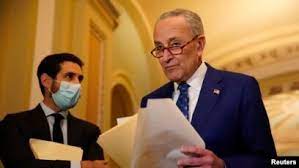US Congress Restarts Push for China Legislation by Year’s End

WASHINGTON —
Lawmakers on Capitol Hill are renewing a push to pass legislation that would boost U.S. competition with China, amid rising concerns about the global supply chain.
Senate Majority Leader Chuck Schumer said Tuesday the long-stalled U.S. Innovation and Competition Act (USICA) would be added to the National Defense Authorization Act (NDAA), the massive annual defense spending bill that needs to be passed by the end of the year.
“A generation ago we used to produce about a third of the world’s chip supply – now fewer than 12% are made in America while other countries have lapped us, particularly China. This hurts American workers, American consumers and American national security. We should pass USICA this year – and it’s a bipartisan bill – so we can strengthen domestic chip production,” Schumer said Tuesday in remarks on the Senate floor.
The USICA passed the U.S. Senate by a 68-32 vote in June but has yet to receive a vote in the U.S. House of Representatives. If passed, the measure would provide $190 billion in funding aimed at addressing areas of competition with China, including semiconductor production, technology security and training for the U.S. workforce. The bill would also provide for automatic sanctions on Chinese companies committing intellectual theft or cyberattacks in the United States.
Sources told Reuters this week that China is actively lobbying against the legislation, sending letters to U.S. executives urging them to lobby Congress to alter or drop those bills.
In a statement released in June when the USICA passed the U.S. Senate, the Foreign Affairs Committee of China’s National People’s Congress (NPC), said “The bill is full of Cold War mentality and ideological prejudice … It slanders China’s development path and its domestic and foreign policies.”
The Biden administration has expressed support for the measures. But any version of the NDAA passed in the U.S. Senate would still have to be reconciled and passed in the U.S. House before heading to the White House to be signed into law.
Addressing U.S. competition with China is one of the few areas of broad bipartisan support on Capitol Hill, although lawmakers differ on the approach.
Following President Biden’s virtual meeting with Chinese President Xi Jinping this week, ranking Senate Foreign Relations Committee member Senator Jim Risch said in a statement, “While President Biden used this meeting to raise concerns regarding Beijing’s unfair trade and economic practices and the importance of transparency in global health, it’s past time for concrete results from Beijing. If President Xi actually wants a cooperative relationship with the United States, then he must stop threatening Taiwan.”
Republican Senator Marco Rubio filed dozens of amendments to the NDAA addressing U.S. competition with China this week, including measures that would strengthen the U.S. relationship with Taiwan, provide funding for analysis of Chinese economic initiatives in developing African nations and clear the way for sanctions on Chinese individuals involved in reclaiming disputed areas in the South China Sea.
There is strong bipartisan support in the U.S. Senate for another measure that would provide U.S. support for Taiwan’s admission into the Inter-American Development Bank as a non-borrowing member.
“Despite Beijing’s reckless and hostile tactics to deny it participation on the world stage, Taiwan has proven a formative and effective partner across the Western hemisphere,” said Senate Foreign Relations Committee Chairman Bob Menendez in a bipartisan October 27 statement supporting the legislation.
Earlier this week, six U.S. lawmakers visited Taiwan as part of a congressional visit to the island whose status has proved to be a constant irritant in U.S.-Chinese relations. China condemned the use of an American military aircraft for the visit.
Read from source:
https://www.voanews.com/a/us-congress-restarts-push-for-china-legislation-by-year-s-end-/6315747.html
















